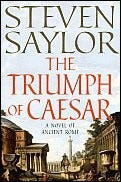Like Saylor's other mystery novels, The Triumph of Caesar is more about the history than the mystery: all the more reason for some readers to relish it. We don't have to be history majors to know Julius Caesar was assassinated. So when his wife Calpurnia summons a reluctant Gordianus the Finder to tell him she's had ominous dreams and warnings, and asks him to find out who may be plotting Caesar's murder, our hearts do not leap into our throats. That one of Gordianus's old friends has already been murdered, possibly by the same person or persons plotting Caesar's death, does little to pull the focus away from Caesar or get the reader wondering "whodunit." There are other reasons to enjoy The Triumph of Caesar.
At the end of the Roman Civil War, with Pompey dead and Caesar appointed dictator for life, Caesar celebrated an unprecedented series of four triumphs. A triumph was something like a Fourth of July parade on steroids, and Caesar's triumphs were all-star affairs, with a lot going on behind the pomp and display. Vercingetorix, the defeated hero of Celtic Gaul, was present. Cleopatra was present. Antony and Brutus and Octavius (the future Caesar Augustus), too, are among the dramatis personae who people this novel.
If we already know a lot about Caesar, Saylor turns up quite a bit that most of us probably don't, like the controversy over his correction of the calendar. And Saylor does surprise us in the end: Gordianus has a more interesting case to solve than readers may have realized, and with the help of the daughter he loves but tends to underestimate, he does solve it. (2008, 311 pages)




